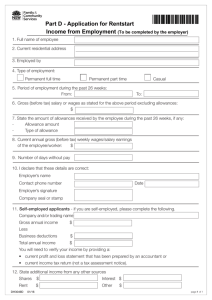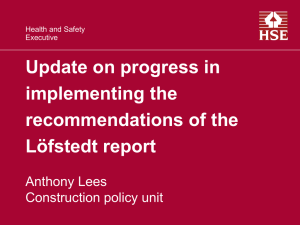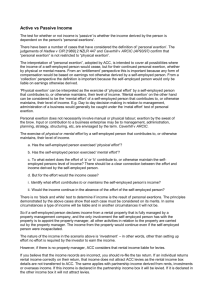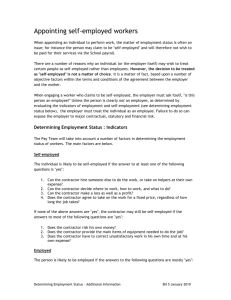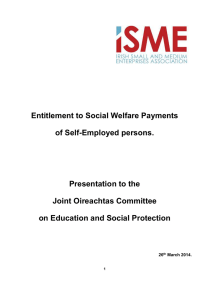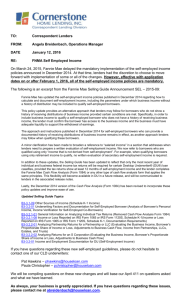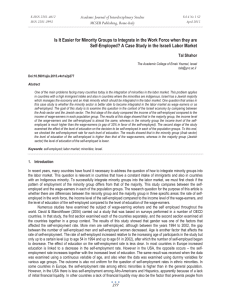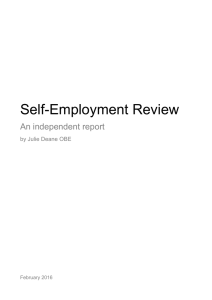The abolition of Class 2 National Insurance: Introducing a benefit
advertisement
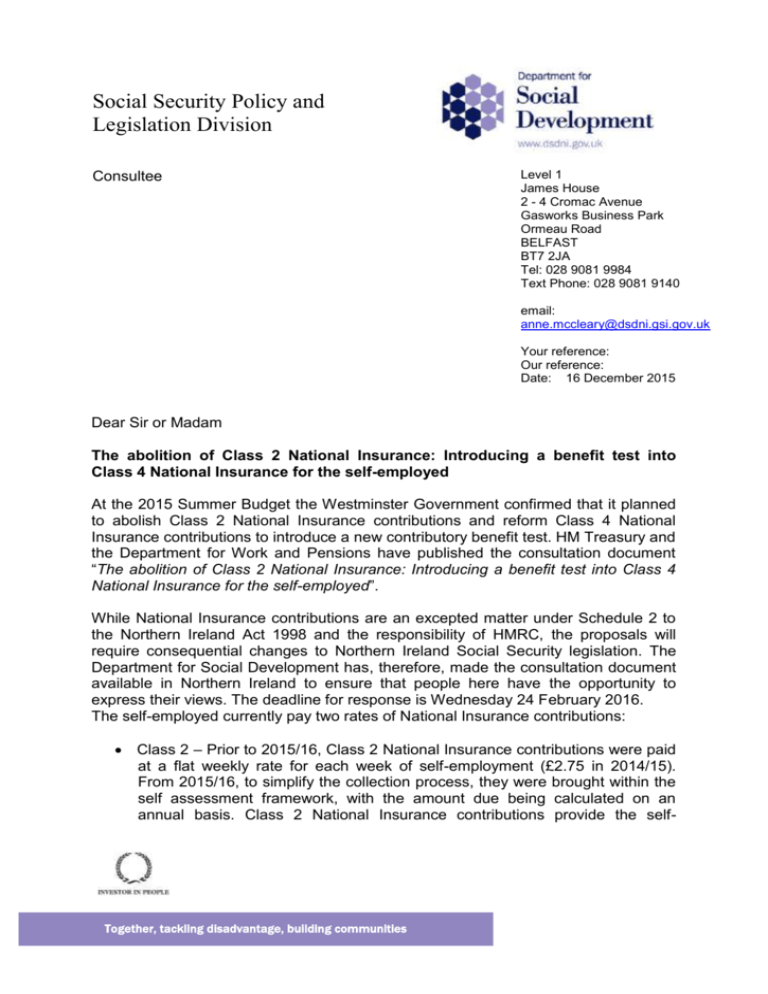
Social Security Policy and Legislation Division Consultee Level 1 James House 2 - 4 Cromac Avenue Gasworks Business Park Ormeau Road BELFAST BT7 2JA Tel: 028 9081 9984 Text Phone: 028 9081 9140 email: anne.mccleary@dsdni.gsi.gov.uk Your reference: Our reference: Date: 16 December 2015 Dear Sir or Madam The abolition of Class 2 National Insurance: Introducing a benefit test into Class 4 National Insurance for the self-employed At the 2015 Summer Budget the Westminster Government confirmed that it planned to abolish Class 2 National Insurance contributions and reform Class 4 National Insurance contributions to introduce a new contributory benefit test. HM Treasury and the Department for Work and Pensions have published the consultation document “The abolition of Class 2 National Insurance: Introducing a benefit test into Class 4 National Insurance for the self-employed”. While National Insurance contributions are an excepted matter under Schedule 2 to the Northern Ireland Act 1998 and the responsibility of HMRC, the proposals will require consequential changes to Northern Ireland Social Security legislation. The Department for Social Development has, therefore, made the consultation document available in Northern Ireland to ensure that people here have the opportunity to express their views. The deadline for response is Wednesday 24 February 2016. The self-employed currently pay two rates of National Insurance contributions: Class 2 – Prior to 2015/16, Class 2 National Insurance contributions were paid at a flat weekly rate for each week of self-employment (£2.75 in 2014/15). From 2015/16, to simplify the collection process, they were brought within the self assessment framework, with the amount due being calculated on an annual basis. Class 2 National Insurance contributions provide the self- Together, tackling disadvantage, building communities employed with access to the State Pension, contribution-based Employment and Support Allowance, Maternity Allowance and Bereavement Benefits. Class 4 – These are a percentage charge on profit. The contributor pays 9 per cent on annual profits between the lower profits limit (£8,060 in 2015/16) and the upper profits limit (£42,385 in 2015/16), and 2 per cent on any profit over that amount. Class 4 National Insurance contributions have no link to benefit entitlement. The proposed changes mean that, in the future, instead of paying two classes of National Insurance contribution, the self-employed will pay just one, Class 4. The consultation explores how a reformed system of National Insurance contributions for the self-employed could confer benefit entitlement and the policy choices that will be considered in designing the new contributory benefit tests. Views are sought from self-employed people, agents who act on behalf of selfemployed people and representative bodies. Responses are particularly welcome from those who pay a special rate of Class 2 (Share Fishermen and Volunteer Development Workers) and other special groups such as Examiners, Ministers of Religion and, in the case of Maternity Allowance, women who participate in the business of their self-employed spouse/civil partner. The consultation paper published recently by the Department for Work and Pensions is available at: https://www.dsdni.gov.uk/consultations/abolition-class-2-national-insuranceintroducing-benefit-test-class-4-national Responses should be sent to the following address: Self-employed NICs consultation C/o Personal Tax team HM Treasury 1 Horse Guards Road London SW1A 2HQ You can also respond using the following e-mail address: class2abolition.newtest@dwp.gsi.gov.uk The information you send to colleagues within the Department or the Department for Work and Pensions may be published in a summary of responses received. All the information contained in your response, including personal information, may be subject to disclosure under the Freedom of Information Act 2000 (FOIA). You Together, tackling disadvantage, building communities may therefore wish to limit any personal information provided or remove it completely. Yours faithfully ANNE McCLEARY Director of Social Security Policy and Legislation Together, tackling disadvantage, building communities
